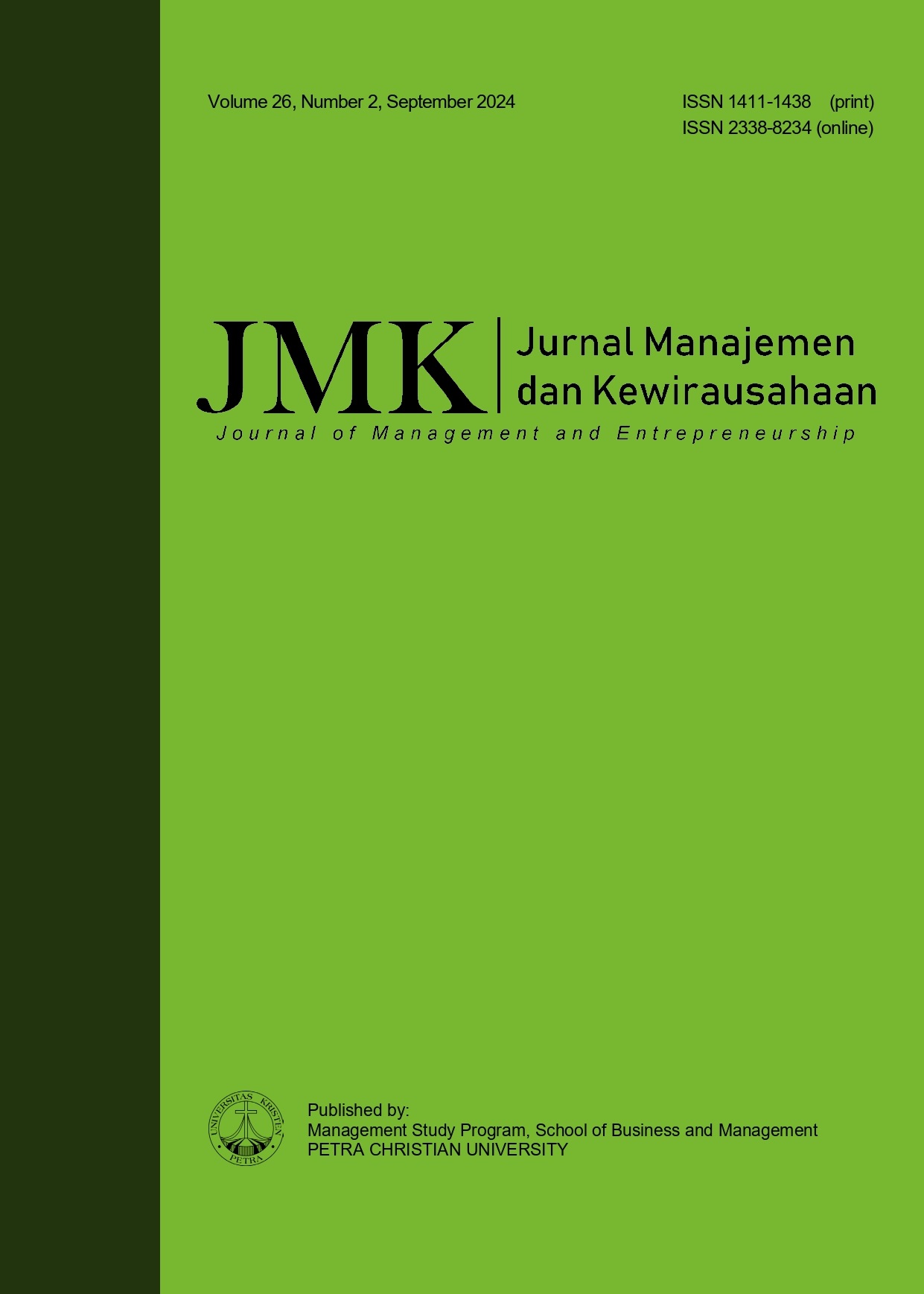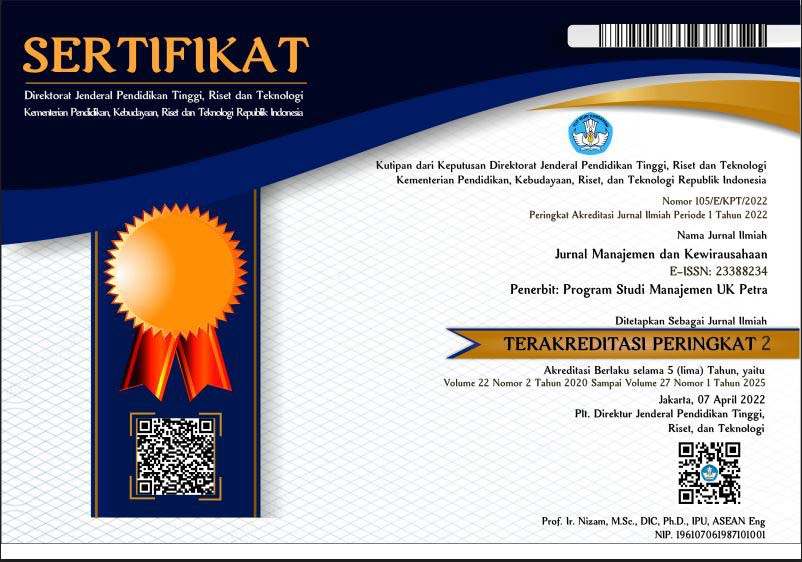THE INTERPLAY OF NOSTALGIA AND MEMORABLE EXPERIENCES: A STUDY ON APPAREL
DOI:
https://doi.org/10.9744/jmk.26.2.79-87Keywords:
Nostalgia, Nostalgic purchase, Social influence, Purchase intention, Experimental designAbstract
This study analyzed the relationship between nostalgia and memorable experiences on consumer purchase intention. While nostalgia was well-researched for Generation X and Y, there was a lack of understanding of how nostalgia influenced Generation Z brands and consumption preferences. Nostalgia marketing has been popular for several years, and there was literature on product and service categories, such as movie remakes, band reunions, candy, and brands that have completed their life cycle and could be re-released to the market by appealing to consumers nostalgia. It used a sample of 135 observations and sneakers stimuli advertising with nostalgic components. Results showed that nostalgia affected purchase intention directly and the retrieval of memorable experiences of using the apparel product. However, it did not translate to purchase intention. The results helped marketers identify courses of action to create effective communication that triggers consumers' purchase intention who did not require product development.
References
Akgün, A. E., Senturk, H. A., Keskin, H., & Onal, I. (2020). The relationships among nostalgic emotion, destination images and tourist behaviors: An empirical study of Istanbul. Journal of Destination Marketing and Mana¬ge¬ment, 16, 100355. https://doi.org/10.1016/j.jdmm.2019.03.009
Alkhafagi, Y. A. M. (2023). The effect of nostalgia marketing on consumers’ purchase intention. Journal of Economics and Administrative Sciences, 29(136), 27–39. https://doi.org/10.33095/jeas.v29i136.2603
Amatulli, C., Peluso, A. M., Sestino, A., Guido, G., & Belk, R. (2023). The influence of a lockdown on consumption: An exploratory study on Generation Z’s consumers. Journal of Retailing and Consumer Services, 73, 103358. https://doi.org/10.1016/j.jretconser.2023.103358
Ashraf, R., & Merunka, D. (2017). The use and misuse of student samples: An empirical in-vestigation of European marketing research. Journal of Consumer Behaviour, 16(4), 295 –308. https://doi.org/10.1002/cb.1590
Banerjee, S., & Shaikh, A. (2022). Impact of brand nostalgia on intention to purchase brand extensions: Moderating role of brand attachment. Journal of Product and Brand Management, 31(7), 1005–1017. https://doi.org/10.1108/JPBM-10-2020-3149
Bergs, Y., Mitas, O., Smit, B., & Nawijn, J. (2020). Anticipatory nostalgia in experience design. Current Issues in Tourism, 23(22), 2798–2810. https://doi.org/10.1080/13683500.2019.1669539
Bhutto, S. A., Shaikh, S., Amar, H., Mangi, Q. A., & Abbas, Q. (2021). What raises purchase intention of customers? An extension in per-spective of nostalgic marketing. Journal of Social Sciences Advancement, 2(4), 135–144. https://doi.org/10.52223/JSSA21-0204 05-26
Cho, H., Lee, H. W., & Chiu, W. (2021). Satellite fans: Does sport nostalgia influence purchase inten¬tion toward sponsors’ products? Journal of Retailing and Consumer Services, 62, 102653. https://doi.org/10.1016/j.jretconser.2021.102653
Chopra, A., Avhad, V., & Jaju, S. (2021). Influencer marketing: An exploratory study to identify antecedents of consumer behavior of millennial. Business Perspectives and Research, 9(1), 77–91. https://doi.org/10.1177/2278533720923486
Cui, R. (2015). A review of nostalgic marketing. Journal of Service Science and Management, 8, 125–131. https://doi.org/10.4236/jssm.2015.81015
Davies, C., Page, B., Driesener, C., Anesbury, Z., Yang, S., & Bruwer, J. (2022). The power of nostalgia: Age and preference for popular music. Marketing Letters, 33, 681–692. https://doi.org/10.1007/s11002-022-09626-7
Fan, Y., Jiang, J., & Hu, Z. (2020). Abandoning distinctiveness: The influence of nostalgia on consumer choice. Psychology & Marketing, 37(10), 1342–1351. https://doi.org/10.1002/mar.21370
Finch, W. H., & French, B. F. (2015). Latent variable modeling with R. New York, NY: Routledge. https://doi.org/10.4324/978131586 9797
Ford, J. B., Merchant, A., Bartier, A.-L., & Friedman, M. (2018). The cross-cultural scale development process: The case of brand-evoked nostalgia in Belgium and the United States. Journal of Business Research, 83, 19–29. https://doi.org/10.1016/j.jbusres.2017. 09.049
Gajanova, L., & Zdenka, V. (2020). Retro marketing - A phenomenon of times. Technology Proceedings of the 3rd Annual Conference, Transfer: Innovative Solutions in Social Sciences and Humanities, 42–44. https://doi.org/10.21303/2613-5647.2020.001299
Gammon, S., & Ramshaw, G. (2021). Distancing from the present: Nostalgia and leisure in lockdown. Leisure Sciences, 43(1–2), 131–137. https://doi.org/10.1080/01490400.2020.1773993
Gergen, K. J. (2019). The social construction of reality. In M. Pfadenhauer, & H. Knoblauch (Eds.), Social constructivism as paradigm? The legacy of the social construction of reality (pp. 259–272). London, UK: Routledge. https://doi.org/10.4324/9780429467714 -17
Ghobadi, T., Shahrokh, Z. D., & Ardestani, A. S. (2018). Impact of personal insecurity on the behavior of purchasing nostalgic products. Management Research in Iran, 22(2), 179–203.
Gu, Q., Li, M., & Kim, S. S. (2021). The role of nostalgia-evoking stimuli at nostalgia-themed restaurants in explaining benefits, consumption value and post-purchase behavioral intention. International Journal of Hospitality Manage-ment, 96, 102955. https://doi.org/10.1016/j.ijhm.2021.102955
Hazari, S., Talpade, S., & Brown, C. O. (2024). Do brand influencers matter on TikTok? A social influence theory perspective. Journal of Marketing Theory and Practice, 32(3), 271–289. https://doi.org/10.1080/10696679.2023.2217488
Hungenberg, E., Slavich, M., Bailey, A., & Sawyer, T. (2020). Examining minor league baseball spectator nostalgia: A neuroscience perspective. Sport Management Review, 23(5), 824–837. https://doi.org/10.1016/j.smr. 2020.04.001
Jensen, S., & Ohlwein, M. (2020). The impact of brand nostalgia on purchase intention among Gen Y. Journal of Emerging Trends in Marketing and Management, I(1), 111–121.
Jiang, H., Ge, J., & Yao, J. (2024). Effects of brand spokes-characters with personal and historical nostalgia on brand attitude: Evidence from Generation Z consumers in China. Asia Pacific Journal of Marketing and Logistics, 36(1), 185–205. https://doi.org/10.1108/APJML-11-2022-0944
Keim, C., & Wagner, R. (2018). Back in time to move forward: An empirical study on luxury fashion vintage drivers. Journal of Global Fashion Marketing, 9(2), 87–102. https://doi.org/10.1080/20932685.2018.1432408
Keskin, E., Aktaş, F., Yayla, Ö., & Dedeoğlu, B. B. (2024). The importance of nostalgic emotions and memorable tourism experience in the cultural experience. Journal of Quality Assurance in Hospitality & Tourism, 25(1), 1–21. https://doi.org/10.1080/1528008X.2022.2097976
Kim, J.-H., Ritchie, J. R. B., & McCormick, B. (2012). Development of a scale to measure memorable tourism experiences. Journal of Travel Research, 51(1), 12–25. https://doi.org/10.1177/0047287510385467
Kutlu, D., & Ayyildiz, H. (2021). The role of the destination image in creating memorable tourism experience. Journal of Tourism and Services, 12(23), 199–216. https://doi.org/10.29036/JOTS.V12I23.303
Li, B. (2018). The influence of brand experience on people’s revisit and purchase intention in the context of China’s museum. American Journal of Industrial and Business Management, 8(3), 563–578. https://doi.org/10.4236/ajibm.2018.83037
Özhan, Ş., & Akkaya, D. T. (2021). the effect of nostalgia proneness on ad-evoked nostalgia, brand attitude and purchase intention. Istanbul Business Research, 49(2), 380–396. https://doi.org/10.26650/ibr.2020.49.0 050
Pelletier, M. J., & Collier, J. E. (2018). Experiential purchase quality: Exploring the dimensions and outcomes of highly memorable experiential purchases. Journal of Service Research, 21(4), 456–473. https://doi.org/10.1177/1094670518770042
Puente-Díaz, R., & Cavazos-Arroyo, J. (2021). Experiential purchases, as memorable moments in consumers’ lives, trigger nostalgia. Cogent Business and Management, 8(1), 1944010. https://doi.org/10.1080/23311975.2021.1944010
Putra, R. E., & Fariz, M. (2020). The moderating role of openness to experience: Influence of nostalgia on purchase intention. Jurnal Kajian Manajemen Bisnis, 9(2), 67–79. https://doi.org/10.24036/jkmb.10980300
Rana, S., Raut, S. K., Prashar, S., & Quttainah, M. A. (2022). The transversal of nostalgia from psychology to marketing: What does it portend for future research? International Journal of Organizational Analysis, 30(4), 899–932. https://doi.org/10.1108/IJOA-03-2020-2097
Riaz, K., Hussainy, S. K., & Khan, K. (2022). Nos-talgia advertising and consumer purchase intention: An empirical study from Pakistan. Journal of Asian Finance, 9(4), 0153–0162. https://doi.org/10.13106/jafeb.2022.vol9.no4.0153
Scola, Z., Dwyer, B., & Gordon, B. S. (2023). Time will tell: Examining the role of nostalgia in retro sport merchandise purchase intentions. Sport, Business and Management: An International Journal, 13(5), 548–562. https://doi.org/10.1108/sbm-12-2022-0111
Sedikides, C., Leunissen, J., & Wildschut, T. (2022). The psychological benefits of music-evoked nostalgia. Psychology of Music, 50(6), 2044–2062. https://doi.org/10.1177/03057356211064641
Sharipudin, M.-N. S., Abdullah, N. A., Foo, K. W., Hassim, N., Tóth, Z., & Chan, T. J. (2023). The influence of social media influencer (SMI) and social influence on purchase intention among young consumers. SEARCH Journal of Media and Communication Research, 1–13.
Tang, D., Zheng, Q., Xu, B., Zheng, M., & Chen, J. (2023). Value of nostalgia to agricultural heritage: Consumer’s nostalgia proneness and purchase intention toward traditional tea. Journal of Cleaner Production, 395, 136411. https://doi.org/10.1016/j.jclepro.20 23.136411
Tiwari, A. V., Bajpai, N., Singh, D., & Vyas, V. (2022). Antecedents of hedonism affecting memorable tourism experience (MTE) lead¬ing to revisit intention in tourists. International Journal of Tourism Cities, 8(3), 588–602. https://doi.org/10.1108/IJTC-03-2021-0043
Vredeveld, A., & Kara, S. (2022). Using brands to reconnect with our shared past: Brand nos¬talgia in romantic relationships. Journal of Product and Brand Management, 31(6), 938 –950. https://doi.org/10.1108/JPBM-01-2021-3335
Weingarten, E., & Wei, Z. (2023). Nostalgia and consumer behavior. Current Opinion in Psychology, 49, 101555. https://doi.org/10.1016/j.copsyc.2022.101555
Xia, L., Wang, J., & Santana, S. (2021). Nos¬tal¬gia: Triggers and its role on new product purchase intentions. Journal of Business Re¬search, 135, 183–194. https://doi.org/10.1016/j.jbusres.2021.06.034
Youn, S., & Dodoo, N. A. (2021). The power of brand nostalgia: Contrasting brand personality dimensions and consumer-brand relationships of nostalgic and non-nostalgic brands. Journal of Consumer Behaviour, 20(6), 1373–1387. https://doi.org/10.1002/cb.1941
Youn, S., & Jin, S. V. (2017). Reconnecting with the past in social media: The moderating role of social influence in nostalgia marketing on Pinterest. Journal of Consumer Behaviour, 16(6), 565–576. https://doi.org/10.1002/cb.1655
Zhang, H., Wu, Y., & Buhalis, D. (2018). A model of perceived image, memorable tourism ex-periences and revisit intention. Journal of Destination Marketing and Management, 8, 326–336. https://doi.org/10.1016/j.jdmm.2017.06.004
Zhang, Y., & Tao, W. (2022). The impact of nostalgia proneness on online donation willingness: The mediating effect of consumer-brand relationship. Frontiers in Psychology, 13, 927330.
Zhou, X., van Tilburg, W. A. P., Mei, D., Wild¬schut, T., & Sedikides, C. (2019). Hungering for the past: Nostalgic food labels increase purchase intentions and actual consumption. Appetite, 140, 151–158. https://doi.org/10.1016/j.appet.2019.05.007
Downloads
Published
How to Cite
Issue
Section
License
Copyright (c) 2024 Alberto Borbolla Albores, Salomón Domínguez la Cruz, Pável Reyes-Mercado

This work is licensed under a Creative Commons Attribution 4.0 International License.
Authors who publish on this journal agree to the following terms:
- Authors retain copyright and grant the journal right of first publication with the work simultaneously licensed under a Creative Commons Attribution License that allows others to share the work with an acknowledgement of the work's authorship and initial publication in this journal.
- Authors are able to enter into separate, additional contractual arrangements for the non-exclusive distribution of the journal's published version of the work (e.g., post it to an institutional repository or publish it in a book), with an acknowledgement of its initial publication in this journal.
- Authors are permitted and encouraged to post their work online (e.g., in institutional repositories or on their website) prior to and during the submission process, as it can lead to productive exchanges, as well as earlier and greater citation of published work (See The Effect of Open Access).


















